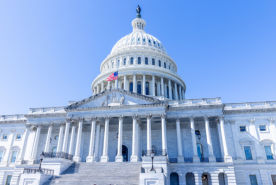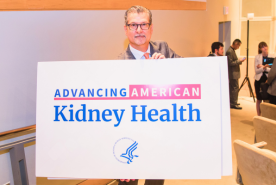September 11, 2025
Time is running out. Living donor protections, tax credits, and obesity prevention are on the line. Join NKF in advocating before deadlines pass.
This fall, Congress faces three critical decisions that directly affect kidney patients and living donors. By raising your voice, you can help protect living kidney donors, lower health care costs, and expand prevention options for kidney disease.
Every call, email, and story you share makes a difference. Here is how to help move the life-saving legislation forward.
1. LDPA: Protecting Kidney Donors From Insurance Discrimination
Every day, 14 people on transplant waitlists die waiting for kidneys. Yet nearly 25% of potential living kidney donors face insurance discrimination, even after careful health screenings.
The Living Donor Protection Act (H.R. 4583, H.R. 4582, S. 1552) would:
- Prohibit discrimination in life, disability, and long-term care insurance for living kidney donors
- Clarify FMLA eligibility so donors can recover with job protection
Why now matters: Both House sponsors, Rep. Don Bacon (R-NE) and Rep Jerry Nadler (D-NY), are retiring in 2026, creating a limited two-year window to advance this bipartisan legislation. To position the bill for a 2026 year-end package, we must build cosponsor momentum in 2025.
Take Action
Complete our LDPA action alert. Then follow up with phone calls and consider visiting your representatives' local offices. Your voice helps build the case for life-saving legislation.
Enhanced Premium Tax Credits: Preventing Skyrocketing Health Care Costs
The Enhanced Advanced Premium Tax Credits, which help millions of Americans, including those with kidney disease, afford health coverage, are set to expire.
Deadline: September 30, 2025. If Congress misses this date, patients will likely see premium increases starting in January 2026.
What’s at stake:
- A family of four with kidney disease earning $60,000: $2,700 annual premium increase
- A 60-year-old dialysis patient earning $45,000: $2,000 annual premium increase
- 4.2 million people could lose insurance coverage entirely
Take Action
Sign our action alert. Then, contact your Members of Congress today and urge them to extend the Enhanced Premium Tax Credits before the September 30 deadline. Share how rising costs would affect you or your family. Every call and email helps protect health care coverage for millions, including people with kidney disease.
3. Treat and Reduce Obesity Act: Expanding Prevention to Save Lives
Obesity drives diabetes and hypertension—the top two causes of kidney disease. Currently, Medicare only covers behavioral therapy when provided by primary care providers.
The Treat and Reduce Obesity Act (S.1973 & H.R.4231) would expand Medicare coverage to include:
- Intensive behavioral therapy from registered dietitians
- FDA-approved weight loss medications
By improving access to treatment, TROA can help prevent kidney disease and slow its progression.
Take Action
Add your name to support access to obesity treatments. Then let your representatives know that expanding access to nutrition counseling and safe weight-loss treatments can help prevent kidney disease and save lives.
Beyond Action Alerts
Completing our action alert is just the beginning. Here's how to maximize your impact.
1. Contact Congress Directly
- Call or email your Members of Congress. Personal stories about kidney disease are more moving than action alerts. Mention bill numbers when you can (H.R. 4583 & H.R. 4582 in the House, S. 1552 in the Senate).
- Visit their local office. Even dropping off a flyer or note makes sure staff hear your message.
Not sure who represents you? Find them here.
2. Speak Up in the Media and Online
- Write a short letter to the editor. Local papers often reach your representatives and their staff.
- Use social media. Post about kidney health, tag your Members of Congress, and use hashtags to spread the word.
3. Mobilize Your Community
- Ask family and friends to take action. Every extra call, email, or form sent shows Congress that people care.
- Share posts. Reposting content helps more people learn and join in.
September 30 is a firm deadline for enhanced premium tax credits due to federal budget rules—missing it will cause premiums to increase.
The Living Donor Protection Act needs to get done this Congress, because current House sponsors are retiring at the end of 2026.
Keep the pressure on by using more than one channel—like phone, email, and social media—to move legislation forward.
For questions about these priorities or guidance on contacting your representatives, email Lauren Drew, Sr. Director of Congressional Relations, at lauren.drew@kidney.org.









